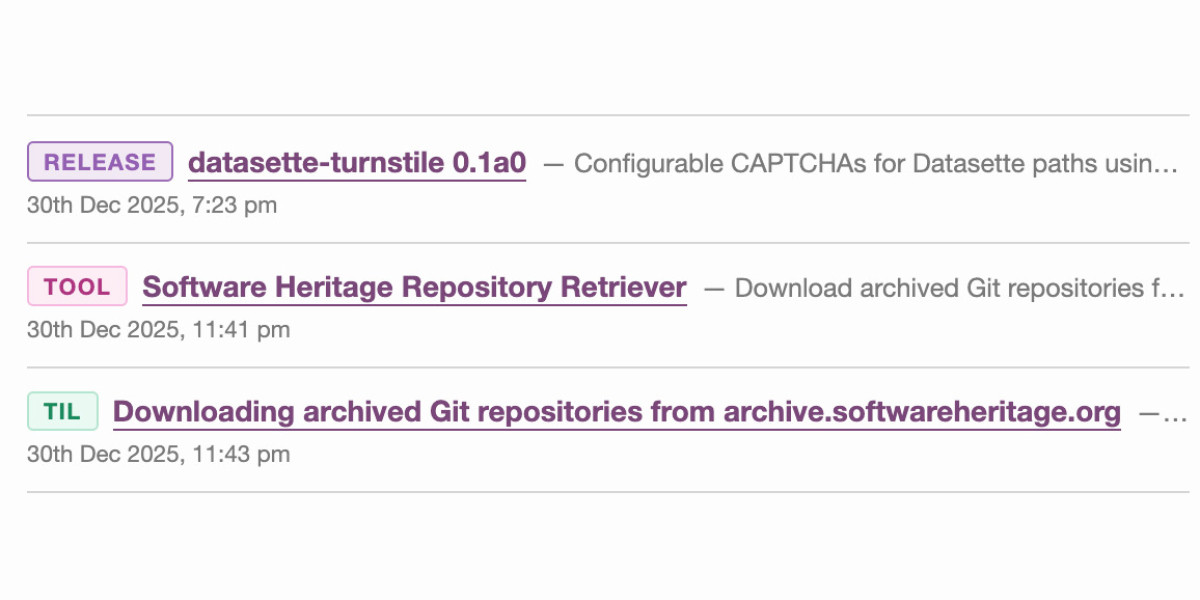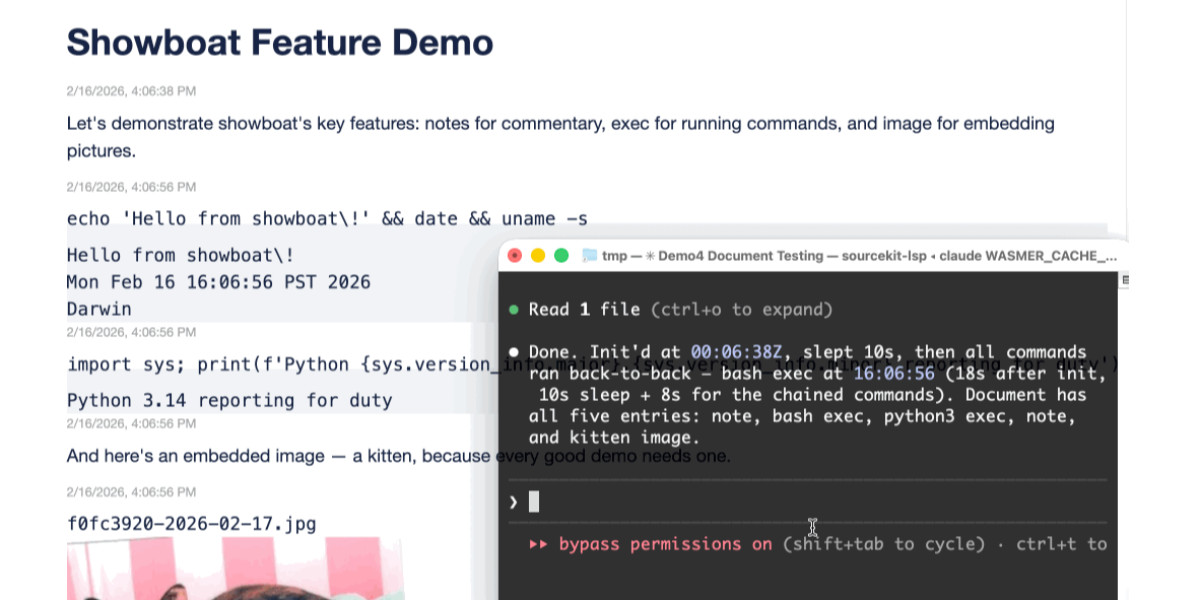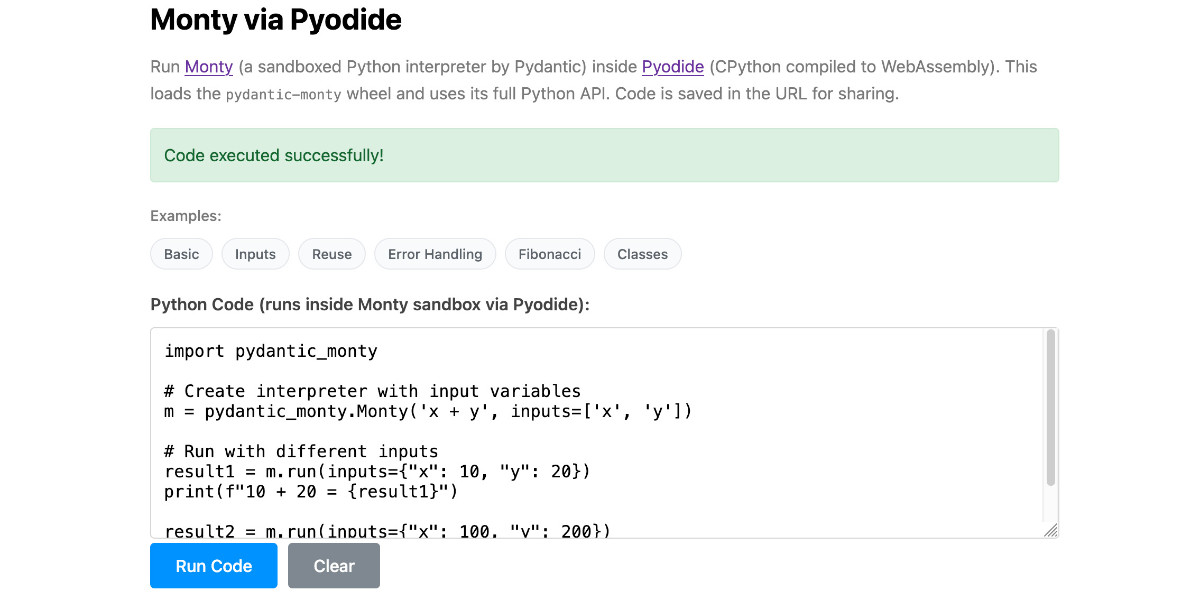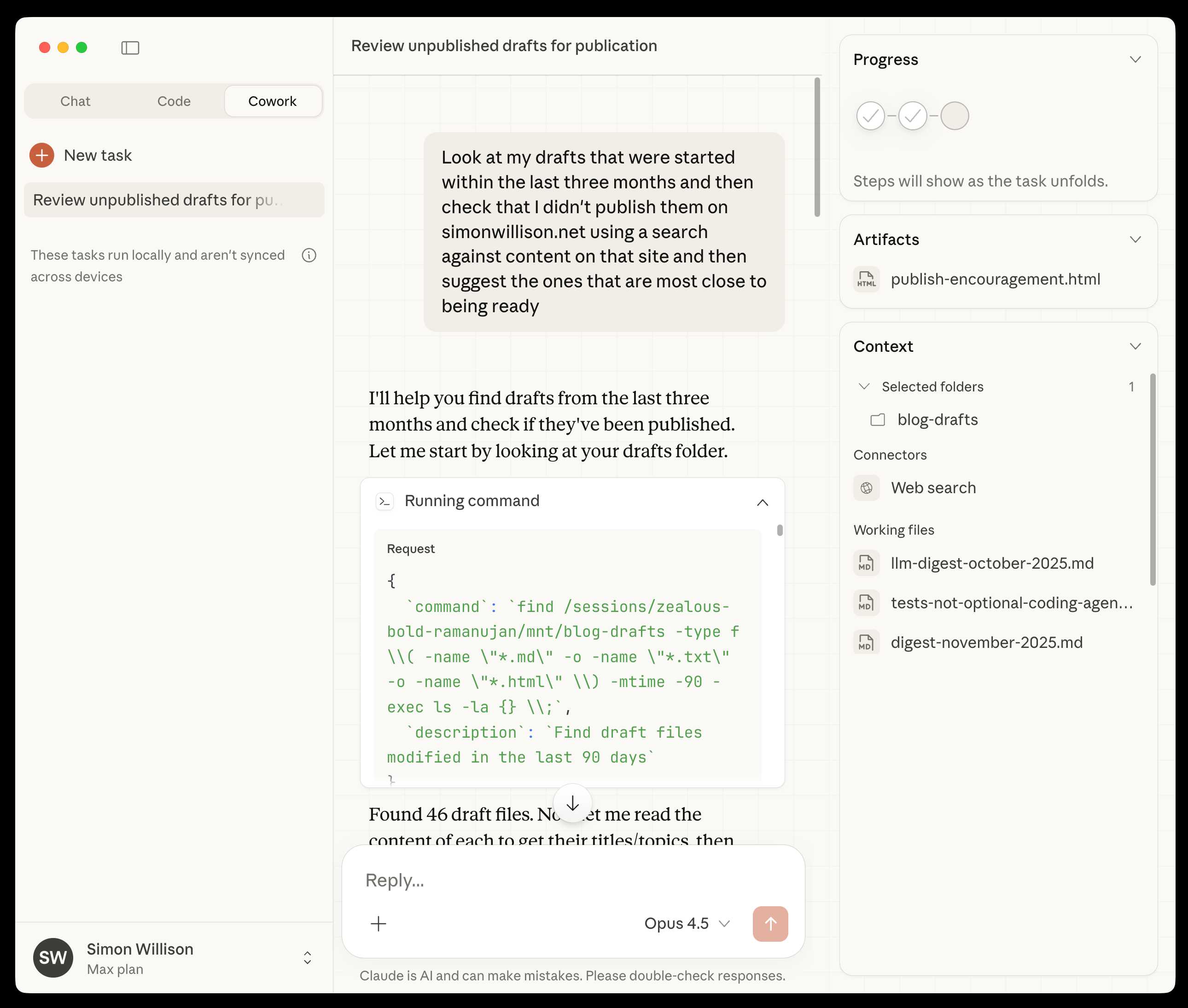97 posts tagged “claude-code”
Claude Code is Anthropic's terminal coding agent, enabling Claude to run tools in a loop on your own machine.
2026
GIF optimization tool using WebAssembly and Gifsicle
I like to include animated GIF demos in my online writing, often recorded using LICEcap. There's an example in the Interactive explanations chapter.
These GIFs can be pretty big. I've tried a few tools for optimizing GIF file size and my favorite is Gifsicle by Eddie Kohler. It compresses GIFs by identifying regions of frames that have not changed and storing only the differences, and can optionally reduce the GIF color palette or apply visible lossy compression for greater size reductions.
Gifsicle is written in C and the default interface is a command line tool. I wanted a web interface so I could access it in my browser and visually preview and compare the different settings. [... 1,603 words]
Claude Code Remote Control (via) New Claude Code feature dropped yesterday: you can now run a "remote control" session on your computer and then use the Claude Code for web interfaces (on web, iOS and native desktop app) to send prompts to that session.
It's a little bit janky right now. Initially when I tried it I got the error "Remote Control is not enabled for your account. Contact your administrator." (but I am my administrator?) - then I logged out and back into the Claude Code terminal app and it started working:
claude remote-control
You can only run one session on your machine at a time. If you upgrade the Claude iOS app it then shows up as "Remote Control Session (Mac)" in the Code tab.
It appears not to support the --dangerously-skip-permissions flag (I passed that to claude remote-control and it didn't reject the option, but it also appeared to have no effect) - which means you have to approve every new action it takes.
I also managed to get it to a state where every prompt I tried was met by an API 500 error.
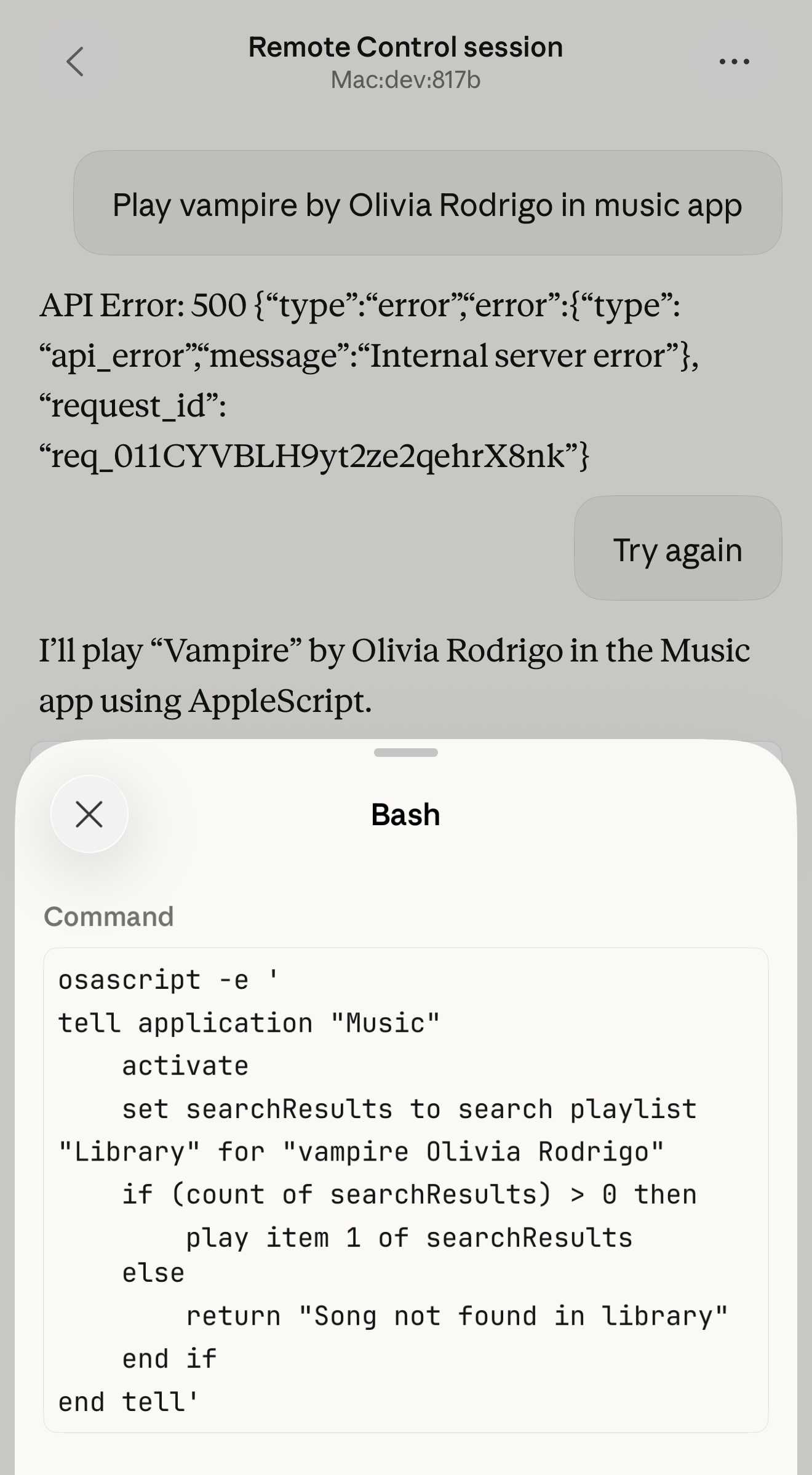
Restarting the program on the machine also causes existing sessions to start returning mysterious API errors rather than neatly explaining that the session has terminated.
I expect they'll iron out all of these issues relatively quickly. It's interesting to then contrast this to solutions like OpenClaw, where one of the big selling points is the ability to control your personal device from your phone.
Claude Code still doesn't have a documented mechanism for running things on a schedule, which is the other killer feature of the Claw category of software.
Update: I spoke too soon: also today Anthropic announced Schedule recurring tasks in Cowork, Claude Code's general agent sibling. These do include an important limitation:
Scheduled tasks only run while your computer is awake and the Claude Desktop app is open. If your computer is asleep or the app is closed when a task is scheduled to run, Cowork will skip the task, then run it automatically once your computer wakes up or you open the desktop app again.
I really hope they're working on a Cowork Cloud product.
Adding TILs, releases, museums, tools and research to my blog
I’ve been wanting to add indications of my various other online activities to my blog for a while now. I just turned on a new feature I’m calling “beats” (after story beats, naming this was hard!) which adds five new types of content to my site, all corresponding to activity elsewhere.
[... 614 words]Long running agentic products like Claude Code are made feasible by prompt caching which allows us to reuse computation from previous roundtrips and significantly decrease latency and cost. [...]
At Claude Code, we build our entire harness around prompt caching. A high prompt cache hit rate decreases costs and helps us create more generous rate limits for our subscription plans, so we run alerts on our prompt cache hit rate and declare SEVs if they're too low.
Reached the stage of parallel agent psychosis where I've lost a whole feature - I know I had it yesterday, but I can't seem to find the branch or worktree or cloud instance or checkout with it in.
... found it! Turns out I'd been hacking on a random prototype in /tmp and then my computer crashed and rebooted and I lost the code... but it's all still there in ~/.claude/projects/ session logs and Claude Code can extract it out and spin up the missing feature again.
The A.I. Disruption We’ve Been Waiting for Has Arrived. New opinion piece from Paul Ford in the New York Times. Unsurprisingly for a piece by Paul it's packed with quoteworthy snippets, but a few stood out for me in particular.
Paul describes the November moment that so many other programmers have observed, and highlights Claude Code's ability to revive old side projects:
[Claude Code] was always a helpful coding assistant, but in November it suddenly got much better, and ever since I’ve been knocking off side projects that had sat in folders for a decade or longer. It’s fun to see old ideas come to life, so I keep a steady flow. Maybe it adds up to a half-hour a day of my time, and an hour of Claude’s.
November was, for me and many others in tech, a great surprise. Before, A.I. coding tools were often useful, but halting and clumsy. Now, the bot can run for a full hour and make whole, designed websites and apps that may be flawed, but credible. I spent an entire session of therapy talking about it.
And as the former CEO of a respected consultancy firm (Postlight) he's well positioned to evaluate the potential impact:
When you watch a large language model slice through some horrible, expensive problem — like migrating data from an old platform to a modern one — you feel the earth shifting. I was the chief executive of a software services firm, which made me a professional software cost estimator. When I rebooted my messy personal website a few weeks ago, I realized: I would have paid $25,000 for someone else to do this. When a friend asked me to convert a large, thorny data set, I downloaded it, cleaned it up and made it pretty and easy to explore. In the past I would have charged $350,000.
That last price is full 2021 retail — it implies a product manager, a designer, two engineers (one senior) and four to six months of design, coding and testing. Plus maintenance. Bespoke software is joltingly expensive. Today, though, when the stars align and my prompts work out, I can do hundreds of thousands of dollars worth of work for fun (fun for me) over weekends and evenings, for the price of the Claude $200-a-month plan.
He also neatly captures the inherent community tension involved in exploring this technology:
All of the people I love hate this stuff, and all the people I hate love it. And yet, likely because of the same personality flaws that drew me to technology in the first place, I am annoyingly excited.
Introducing Claude Sonnet 4.6 (via) Sonnet 4.6 is out today, and Anthropic claim it offers similar performance to November's Opus 4.5 while maintaining the Sonnet pricing of $3/million input and $15/million output tokens (the Opus models are $5/$25). Here's the system card PDF.
Sonnet 4.6 has a "reliable knowledge cutoff" of August 2025, compared to Opus 4.6's May 2025 and Haiku 4.5's February 2025. Both Opus and Sonnet default to 200,000 max input tokens but can stretch to 1 million in beta and at a higher cost.
I just released llm-anthropic 0.24 with support for both Sonnet 4.6 and Opus 4.6. Claude Code did most of the work - the new models had a fiddly amount of extra details around adaptive thinking and no longer supporting prefixes, as described in Anthropic's migration guide.
Here's what I got from:
uvx --with llm-anthropic llm 'Generate an SVG of a pelican riding a bicycle' -m claude-sonnet-4.6

The SVG comments include:
<!-- Hat (fun accessory) -->
I tried a second time and also got a top hat. Sonnet 4.6 apparently loves top hats!
For comparison, here's the pelican Opus 4.5 drew me in November:

And here's Anthropic's current best pelican, drawn by Opus 4.6 on February 5th:

Opus 4.6 produces the best pelican beak/pouch. I do think the top hat from Sonnet 4.6 is a nice touch though.
But the intellectually interesting part for me is something else. I now have something close to a magic box where I throw in a question and a first answer comes back basically for free, in terms of human effort. Before this, the way I'd explore a new idea is to either clumsily put something together myself or ask a student to run something short for signal, and if it's there, we’d go deeper. That quick signal step, i.e., finding out if a question has any meat to it, is what I can now do without taking up anyone else's time. It’s now between just me, Claude Code, and a few days of GPU time.
I don’t know what this means for how we do research long term. I don’t think anyone does yet. But the distance between a question and a first answer just got very small.
— Dimitris Papailiopoulos, on running research questions though Claude Code
Two new Showboat tools: Chartroom and datasette-showboat
I introduced Showboat a week ago—my CLI tool that helps coding agents create Markdown documents that demonstrate the code that they have created. I’ve been finding new ways to use it on a daily basis, and I’ve just released two new tools to help get the best out of the Showboat pattern. Chartroom is a CLI charting tool that works well with Showboat, and datasette-showboat lets Showboat’s new remote publishing feature incrementally push documents to a Datasette instance.
[... 1,756 words]I'm a very heavy user of Claude Code on the web, Anthropic's excellent but poorly named cloud version of Claude Code where everything runs in a container environment managed by them, greatly reducing the risk of anything bad happening to a computer I care about.
I don't use the web interface at all (hence my dislike of the name) - I access it exclusively through their native iPhone and Mac desktop apps.
Something I particularly appreciate about the desktop app is that it lets you see images that Claude is "viewing" via its Read /path/to/image tool. Here's what that looks like:
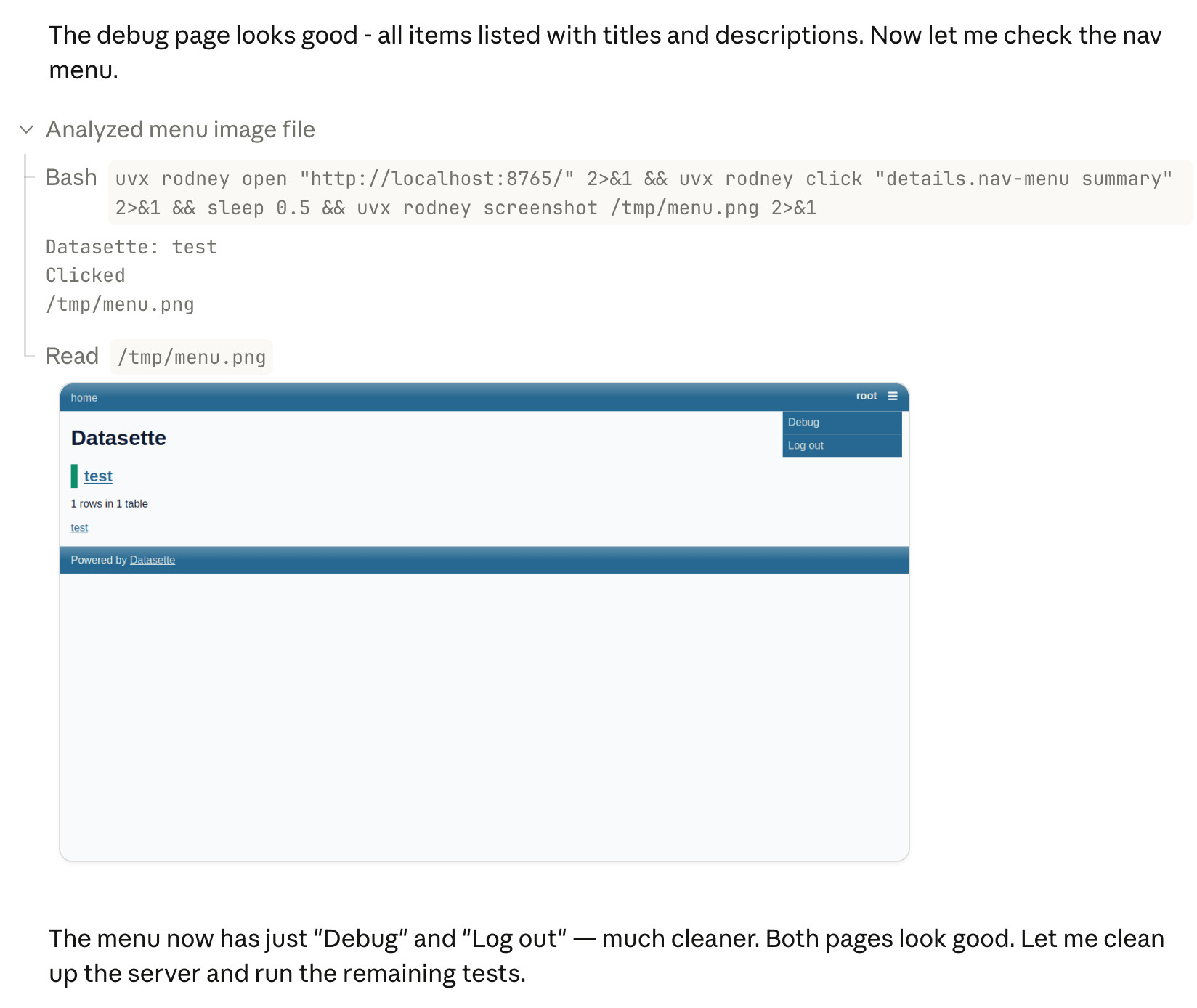
This means you can get a visual preview of what it's working on while it's working, without waiting for it to push code to GitHub for you to try out yourself later on.
The prompt I used to trigger the above screenshot was:
Run "uvx rodney --help" and then use Rodney to manually test the new pages and menu - look at screenshots from it and check you think they look OK
I designed Rodney to have --help output that provides everything a coding agent needs to know in order to use the tool.
The Claude iPhone app doesn't display opened images yet, so I requested it as a feature just now in a thread on Twitter.
Someone has to prompt the Claudes, talk to customers, coordinate with other teams, decide what to build next. Engineering is changing and great engineers are more important than ever.
— Boris Cherny, Claude Code creator, on why Anthropic are still hiring developers
Claude Code was made available to the general public in May 2025. Today, Claude Code’s run-rate revenue has grown to over $2.5 billion; this figure has more than doubled since the beginning of 2026. The number of weekly active Claude Code users has also doubled since January 1 [six weeks ago].
— Anthropic, announcing their $30 billion series G
cysqlite—a new sqlite driver
(via)
Charles Leifer has been maintaining pysqlite3 - a fork of the Python standard library's sqlite3 module that makes it much easier to run upgraded SQLite versions - since 2018.
He's been working on a ground-up Cython rewrite called cysqlite for almost as long, but it's finally at a stage where it's ready for people to try out.
The biggest change from the sqlite3 module involves transactions. Charles explains his discomfort with the sqlite3 implementation at length - that library provides two different variants neither of which exactly match the autocommit mechanism in SQLite itself.
I'm particularly excited about the support for custom virtual tables, a feature I'd love to see in sqlite3 itself.
cysqlite provides a Python extension compiled from C, which means it normally wouldn't be available in Pyodide. I set Claude Code on it (here's the prompt) and it built me cysqlite-0.1.4-cp311-cp311-emscripten_3_1_46_wasm32.whl, a 688KB wheel file with a WASM build of the library that can be loaded into Pyodide like this:
import micropip await micropip.install( "https://simonw.github.io/research/cysqlite-wasm-wheel/cysqlite-0.1.4-cp311-cp311-emscripten_3_1_46_wasm32.whl" ) import cysqlite print(cysqlite.connect(":memory:").execute( "select sqlite_version()" ).fetchone())
(I also learned that wheels like this have to be built for the emscripten version used by that edition of Pyodide - my experimental wheel loads in Pyodide 0.25.1 but fails in 0.27.5 with a Wheel was built with Emscripten v3.1.46 but Pyodide was built with Emscripten v3.1.58 error.)
You can try my wheel in this new Pyodide REPL i had Claude build as a mobile-friendly alternative to Pyodide's own hosted console.
I also had Claude build this demo page that executes the original test suite in the browser and displays the results:
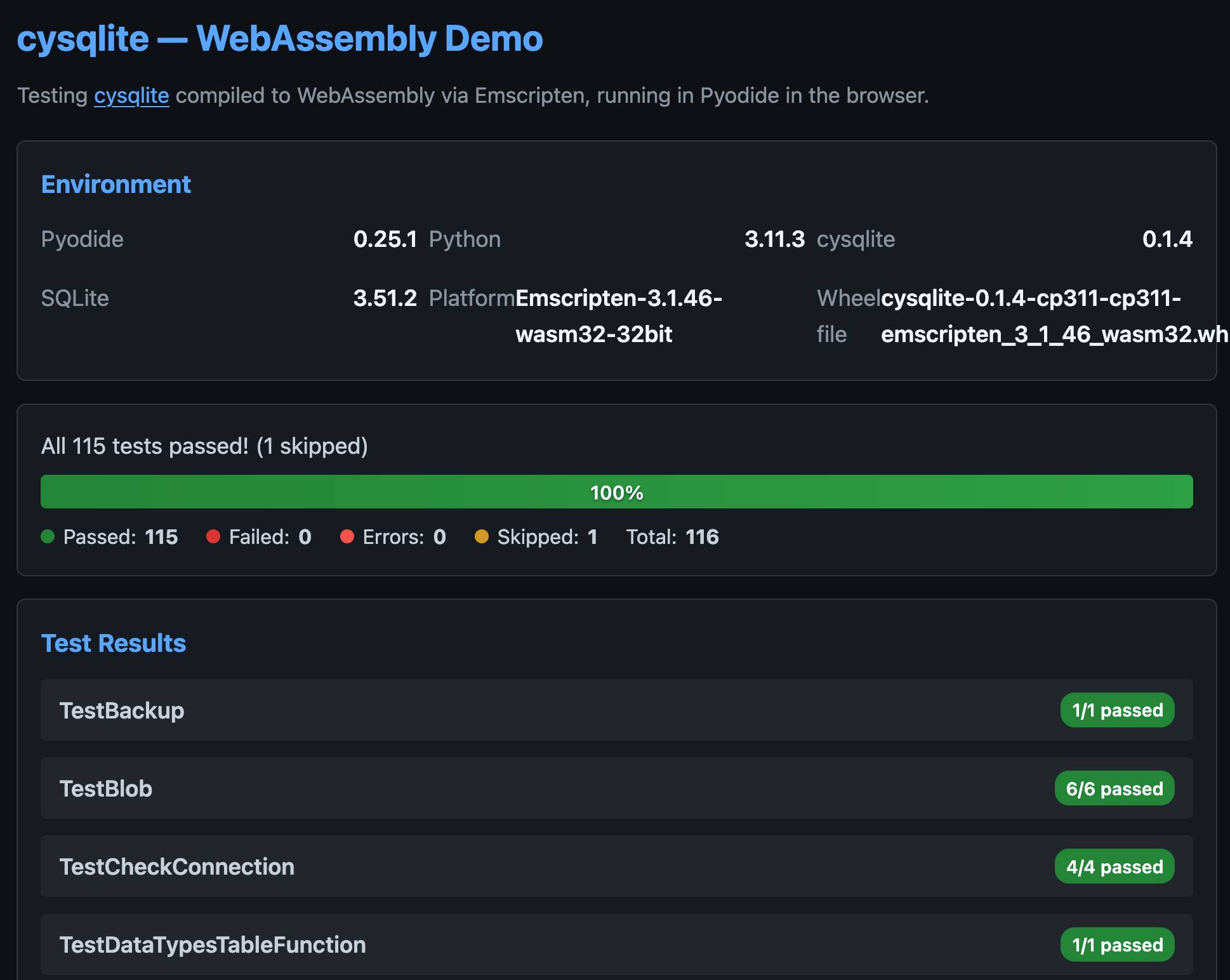
Claude: Speed up responses with fast mode.
New "research preview" from Anthropic today: you can now access a faster version of their frontier model Claude Opus 4.6 by typing /fast in Claude Code... but at a cost that's 6x the normal price.
Opus is usually $5/million input and $25/million output. The new fast mode is $30/million input and $150/million output!
There's a 50% discount until the end of February 16th, so only a 3x multiple (!) before then.
How much faster is it? The linked documentation doesn't say, but on Twitter Claude say:
Our teams have been building with a 2.5x-faster version of Claude Opus 4.6.
We’re now making it available as an early experiment via Claude Code and our API.
Claude Opus 4.5 had a context limit of 200,000 tokens. 4.6 has an option to increase that to 1,000,000 at 2x the input price ($10/m) and 1.5x the output price ($37.50/m) once your input exceeds 200,000 tokens. These multiples hold for fast mode too, so after Feb 16th you'll be able to pay a hefty $60/m input and $225/m output for Anthropic's fastest best model.
Running Pydantic’s Monty Rust sandboxed Python subset in WebAssembly
There’s a jargon-filled headline for you! Everyone’s building sandboxes for running untrusted code right now, and Pydantic’s latest attempt, Monty, provides a custom Python-like language (a subset of Python) in Rust and makes it available as both a Rust library and a Python package. I got it working in WebAssembly, providing a sandbox-in-a-sandbox.
[... 854 words]We gotta talk about AI as a programming tool for the arts. Chris Ashworth is the creator and CEO of QLab, a macOS software package for “cue-based, multimedia playback” which is designed to automate lighting and audio for live theater productions.
I recently started following him on TikTok where he posts about his business and theater automation in general - Chris founded the Voxel theater in Baltimore which QLab use as a combined performance venue, teaching hub and research lab (here's a profile of the theater), and the resulting videos offer a fascinating glimpse into a world I know virtually nothing about.
This latest TikTok describes his Claude Opus moment, after he used Claude Code to build a custom lighting design application for a very niche project and put together a useful application in just a few days that he would never have been able to spare the time for otherwise.
Chris works full time in the arts and comes at generative AI from a position of rational distrust. It's interesting to see him working through that tension to acknowledge that there are valuable applications here to build tools for the community he serves.
I have been at least gently skeptical about all this stuff for the last two years. Every time I checked in on it, I thought it was garbage, wasn't interested in it, wasn't useful. [...] But as a programmer, if you hear something like, this is changing programming, it's important to go check it out once in a while. So I went and checked it out a few weeks ago. And it's different. It's astonishing. [...]
One thing I learned in this exercise is that it can't make you a fundamentally better programmer than you already are. It can take a person who is a bad programmer and make them faster at making bad programs. And I think it can take a person who is a good programmer and, from what I've tested so far, make them faster at making good programs. [...] You see programmers out there saying, "I'm shipping code I haven't looked at and don't understand." I'm terrified by that. I think that's awful. But if you're capable of understanding the code that it's writing, and directing, designing, editing, deleting, being quality control on it, it's kind of astonishing. [...]
The positive thing I see here, and I think is worth coming to terms with, is this is an application that I would never have had time to write as a professional programmer. Because the audience is three people. [...] There's no way it was worth it to me to spend my energy of 20 years designing and implementing software for artists to build an app for three people that is this level of polish. And it took me a few days. [...]
I know there are a lot of people who really hate this technology, and in some ways I'm among them. But I think we've got to come to terms with this is a career-changing moment. And I really hate that I'm saying that because I didn't believe it for the last two years. [...] It's like having a room full of power tools. I wouldn't want to send an untrained person into a room full of power tools because they might chop off their fingers. But if someone who knows how to use tools has the option to have both hand tools and a power saw and a power drill and a lathe, there's a lot of work they can do with those tools at a lot faster speed.
the browser is the sandbox. Paul Kinlan is a web platform developer advocate at Google and recently turned his attention to coding agents. He quickly identified the importance of a robust sandbox for agents to operate in and put together these detailed notes on how the web browser can help:
This got me thinking about the browser. Over the last 30 years, we have built a sandbox specifically designed to run incredibly hostile, untrusted code from anywhere on the web, the instant a user taps a URL. [...]
Could you build something like Cowork in the browser? Maybe. To find out, I built a demo called Co-do that tests this hypothesis. In this post I want to discuss the research I've done to see how far we can get, and determine if the browser's ability to run untrusted code is useful (and good enough) for enabling software to do more for us directly on our computer.
Paul then describes how the three key aspects of a sandbox - filesystem, network access and safe code execution - can be handled by browser technologies: the File System Access API (still Chrome-only as far as I can tell), CSP headers with <iframe sandbox> and WebAssembly in Web Workers.
Co-do is a very interesting demo that illustrates all of these ideas in a single application:
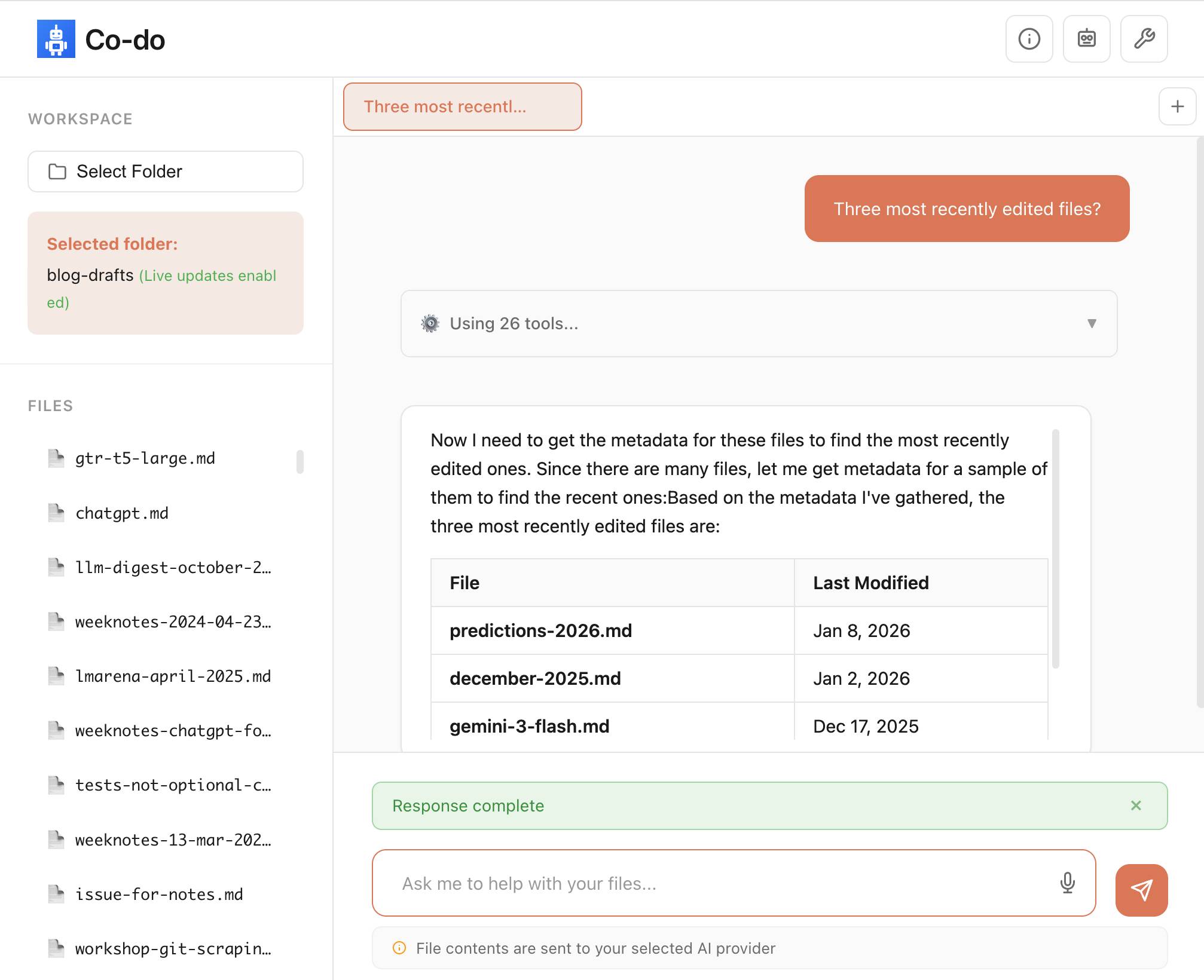
You select a folder full of files and configure an LLM provider and set an API key, Co-do then uses CSP-approved API calls to interact with that provider and provides a chat interface with tools for interacting with those files. It does indeed feel similar to Claude Cowork but without running a multi-GB local container to provide the sandbox.
My biggest complaint about <iframe sandbox> remains how thinly documented it is, especially across different browsers. Paul's post has all sorts of useful details on that which I've not encountered elsewhere, including a complex double-iframe technique to help apply network rules to the inner of the two frames.
Thanks to this post I also learned about the <input type="file" webkitdirectory> tag which turns out to work on Firefox, Safari and Chrome and allows a browser read-only access to a full directory of files at once. I had Claude knock up a webkitdirectory demo to try it out and I'll certainly be using it for projects in the future.
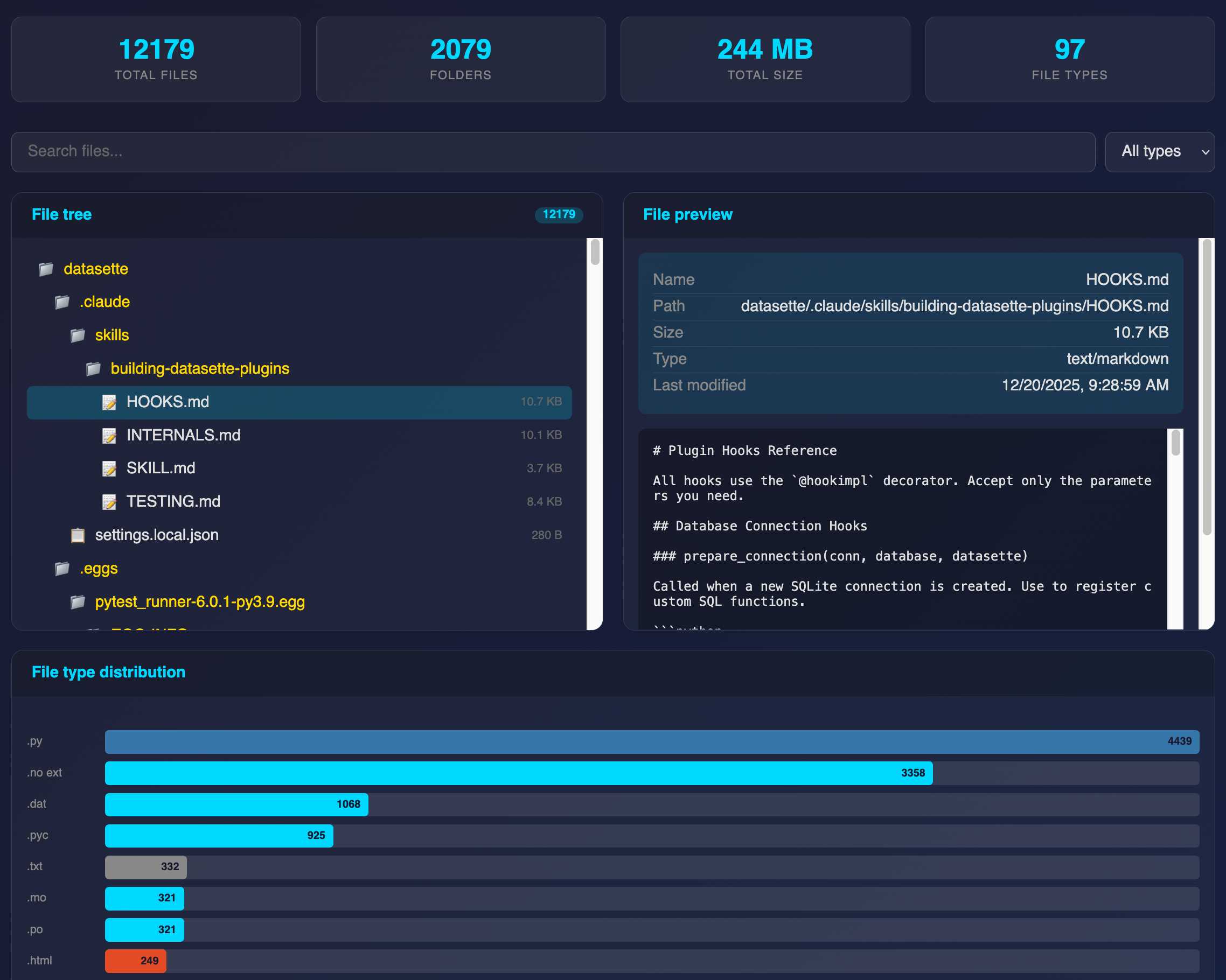
Kākāpō Cam: Rakiura live stream (via) Critical update for this year's Kākāpō breeding season: the New Zealand Department of Conservation have a livestream running of Rakiura's nest!
You’re looking at the underground nest of 23-year-old Rakiura. She has chosen this same site to nest for all seven breeding seasons since 2008, a large cavity under a rātā tree. Because she returns to the site so reliably, we’ve been able to make modifications over the years to keep it safe and dry, including adding a well-placed hatch for monitoring eggs and chicks.
Rakiura is a legendary Kākāpō:
Rakiura hatched on 19 February 2002 on Whenua Hou/Codfish Island. She is the offspring of Flossie and Bill. Her name comes from the te reo Māori name for Stewart Island, the place where most of the founding kākāpō population originated.
Rakiura has nine living descendants, three females and six males, across six breeding seasons. In 2008 came Tōitiiti, in 2009 Tamahou and Te Atapō, in 2011 Tia and Tūtoko, in 2014 Taeatanga and Te Awa, in 2019 Mati-mā and Tautahi. She also has many grandchicks.
She laid her first egg of the season at 4:30pm NZ time on 22nd January. The livestream went live shortly afterwards, once she committed to this nest.
The stream is on YouTube. I used Claude Code to write a livestream-gif.py script and used that to capture this sped-up video of the last few hours of footage, within which you can catch a glimpse of the egg!
If you tell a friend they can now instantly create any app, they’ll probably say “Cool! Now I need to think of an idea.” Then they will forget about it, and never build a thing. The problem is not that your friend is horribly uncreative. It’s that most people’s problems are not software-shaped, and most won’t notice even when they are. [...]
Programmers are trained to see everything as a software-shaped problem: if you do a task three times, you should probably automate it with a script. Rename every IMG_*.jpg file from the last week to hawaii2025_*.jpg, they tell their terminal, while the rest of us painfully click and copy-paste. We are blind to the solutions we were never taught to see, asking for faster horses and never dreaming of cars.
Most people's mental model of Claude Code is that "it's just a TUI" but it should really be closer to "a small game engine".
For each frame our pipeline constructs a scene graph with React then:
-> layout elements
-> rasterize them to a 2d screen
-> diff that against the previous screen
-> finally use the diff to generate ANSI sequences to drawWe have a ~16ms frame budget so we have roughly ~5ms to go from the React scene graph to ANSI written.
— Chris Lloyd, Claude Code team at Anthropic
Electricity use of AI coding agents (via) Previous work estimating the energy and water cost of LLMs has generally focused on the cost per prompt using a consumer-level system such as ChatGPT.
Simon P. Couch notes that coding agents such as Claude Code use way more tokens in response to tasks, often burning through many thousands of tokens of many tool calls.
As a heavy Claude Code user, Simon estimates his own usage at the equivalent of 4,400 "typical queries" to an LLM, for an equivalent of around $15-$20 in daily API token spend. He figures that to be about the same as running a dishwasher once or the daily energy used by a domestic refrigerator.
jordanhubbard/nanolang (via) Plenty of people have mused about what a new programming language specifically designed to be used by LLMs might look like. Jordan Hubbard (co-founder of FreeBSD, with serious stints at Apple and NVIDIA) just released exactly that.
A minimal, LLM-friendly programming language with mandatory testing and unambiguous syntax.
NanoLang transpiles to C for native performance while providing a clean, modern syntax optimized for both human readability and AI code generation.
The syntax strikes me as an interesting mix between C, Lisp and Rust.
I decided to see if an LLM could produce working code in it directly, given the necessary context. I started with this MEMORY.md file, which begins:
Purpose: This file is designed specifically for Large Language Model consumption. It contains the essential knowledge needed to generate, debug, and understand NanoLang code. Pair this with
spec.jsonfor complete language coverage.
I ran that using LLM and llm-anthropic like this:
llm -m claude-opus-4.5 \
-s https://raw.githubusercontent.com/jordanhubbard/nanolang/refs/heads/main/MEMORY.md \
'Build me a mandelbrot fractal CLI tool in this language'
> /tmp/fractal.nano
The resulting code... did not compile.
I may have been too optimistic expecting a one-shot working program for a new language like this. So I ran a clone of the actual project, copied in my program and had Claude Code take a look at the failing compiler output.
... and it worked! Claude happily grepped its way through the various examples/ and built me a working program.
Here's the Claude Code transcript - you can see it reading relevant examples here - and here's the finished code plus its output.
I've suspected for a while that LLMs and coding agents might significantly reduce the friction involved in launching a new language. This result reinforces my opinion.
FLUX.2-klein-4B Pure C Implementation (via) On 15th January Black Forest Labs, a lab formed by the creators of the original Stable Diffusion, released black-forest-labs/FLUX.2-klein-4B - an Apache 2.0 licensed 4 billion parameter version of their FLUX.2 family.
Salvatore Sanfilippo (antirez) decided to build a pure C and dependency-free implementation to run the model, with assistance from Claude Code and Claude Opus 4.5.
Salvatore shared this note on Hacker News:
Something that may be interesting for the reader of this thread: this project was possible only once I started to tell Opus that it needed to take a file with all the implementation notes, and also accumulating all the things we discovered during the development process. And also, the file had clear instructions to be taken updated, and to be processed ASAP after context compaction. This kinda enabled Opus to do such a big coding task in a reasonable amount of time without loosing track. Check the file IMPLEMENTATION_NOTES.md in the GitHub repo for more info.
Here's that IMPLEMENTATION_NOTES.md file.
Claude Cowork Exfiltrates Files (via) Claude Cowork defaults to allowing outbound HTTP traffic to only a specific list of domains, to help protect the user against prompt injection attacks that exfiltrate their data.
Prompt Armor found a creative workaround: Anthropic's API domain is on that list, so they constructed an attack that includes an attacker's own Anthropic API key and has the agent upload any files it can see to the https://api.anthropic.com/v1/files endpoint, allowing the attacker to retrieve their content later.
First impressions of Claude Cowork, Anthropic’s general agent
New from Anthropic today is Claude Cowork, a “research preview” that they describe as “Claude Code for the rest of your work”. It’s currently available only to Max subscribers ($100 or $200 per month plans) as part of the updated Claude Desktop macOS application. Update 16th January 2026: it’s now also available to $20/month Claude Pro subscribers.
[... 1,863 words]I'm not joking and this isn't funny. We have been trying to build distributed agent orchestrators at Google since last year. There are various options, not everyone is aligned... I gave Claude Code a description of the problem, it generated what we built last year in an hour.
It's not perfect and I'm iterating on it but this is where we are right now. If you are skeptical of coding agents, try it on a domain you are already an expert of. Build something complex from scratch where you can be the judge of the artifacts.
[...] It wasn't a very detailed prompt and it contained no real details given I cannot share anything propriety. I was building a toy version on top of some of the existing ideas to evaluate Claude Code. It was a three paragraph description.
— Jaana Dogan, Principal Engineer at Google
[Claude Code] has the potential to transform all of tech. I also think we’re going to see a real split in the tech industry (and everywhere code is written) between people who are outcome-driven and are excited to get to the part where they can test their work with users faster, and people who are process-driven and get their meaning from the engineering itself and are upset about having that taken away.
2025
TIL: Downloading archived Git repositories from archive.softwareheritage.org
(via)
Back in February I blogged about a neat Python library called sqlite-s3vfs for accessing SQLite databases hosted in an S3 bucket, released as MIT licensed open source by the UK government's Department for Business and Trade.
I went looking for it today and found that the github.com/uktrade/sqlite-s3vfs repository is now a 404.
Since this is taxpayer-funded open source software I saw it as my moral duty to try and restore access! It turns out a full copy had been captured by the Software Heritage archive, so I was able to restore the repository from there. My copy is now archived at simonw/sqlite-s3vfs.
The process for retrieving an archive was non-obvious, so I've written up a TIL and also published a new Software Heritage Repository Retriever tool which takes advantage of the CORS-enabled APIs provided by Software Heritage. Here's the Claude Code transcript from building that.
simonw/actions-latest.
Today in extremely niche projects, I got fed up of Claude Code creating GitHub Actions workflows for me that used stale actions: actions/setup-python@v4 when the latest is actions/setup-python@v6 for example.
I couldn't find a good single place listing those latest versions, so I had Claude Code for web (via my phone, I'm out on errands) build a Git scraper to publish those versions in one place:
https://simonw.github.io/actions-latest/versions.txt
Tell your coding agent of choice to fetch that any time it wants to write a new GitHub Actions workflows.
(I may well bake this into a Skill.)
Here's the first and second transcript I used to build this, shared using my claude-code-transcripts tool (which just gained a search feature.)
A year ago, Claude struggled to generate bash commands without escaping issues. It worked for seconds or minutes at a time. We saw early signs that it may become broadly useful for coding one day.
Fast forward to today. In the last thirty days, I landed 259 PRs -- 497 commits, 40k lines added, 38k lines removed. Every single line was written by Claude Code + Opus 4.5.
— Boris Cherny, creator of Claude Code
